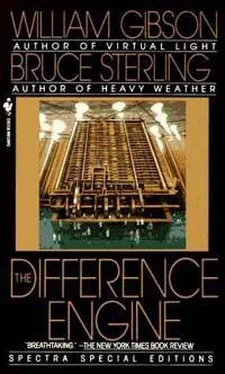William Gibson - The Difference Engine
Здесь есть возможность читать онлайн «William Gibson - The Difference Engine» весь текст электронной книги совершенно бесплатно (целиком полную версию без сокращений). В некоторых случаях можно слушать аудио, скачать через торрент в формате fb2 и присутствует краткое содержание. Жанр: sf_cyber_punk, fantasy_alt_hist, на английском языке. Описание произведения, (предисловие) а так же отзывы посетителей доступны на портале библиотеки ЛибКат.
- Название:The Difference Engine
- Автор:
- Жанр:
- Год:неизвестен
- ISBN:нет данных
- Рейтинг книги:3 / 5. Голосов: 1
-
Избранное:Добавить в избранное
- Отзывы:
-
Ваша оценка:
- 60
- 1
- 2
- 3
- 4
- 5
The Difference Engine: краткое содержание, описание и аннотация
Предлагаем к чтению аннотацию, описание, краткое содержание или предисловие (зависит от того, что написал сам автор книги «The Difference Engine»). Если вы не нашли необходимую информацию о книге — напишите в комментариях, мы постараемся отыскать её.
The Difference Engine — читать онлайн бесплатно полную книгу (весь текст) целиком
Ниже представлен текст книги, разбитый по страницам. Система сохранения места последней прочитанной страницы, позволяет с удобством читать онлайн бесплатно книгу «The Difference Engine», без необходимости каждый раз заново искать на чём Вы остановились. Поставьте закладку, и сможете в любой момент перейти на страницу, на которой закончили чтение.
Интервал:
Закладка:
These snow-swept streets,
Into the great map of London,
forgetting
MODUS
The Images Tabled
The circular arrangement of the axes of the Difference Engine 'round large central wheels led to the most extended prospects. The whole of arithmetic now appeared within the grasp of mechanism. A vague glimpse even of an Analytical Engine opened out, and I pursued with enthusiasm the shadowy vision.
The drawings and the experiments were of the most costly kind. Draftsmen of the highest order were engaged, to economize the labor of my own head; whilst skilled workmen executed the experimental machinery.
In order to carry out my pursuits successfully, I had purchased a house with about a quarter of an acre of ground, in a very quiet locality in London. My coach-house was converted into a forge and foundry, whilst my stables were transformed into a workshop. I built other extensive workshops myself, and had a fire-proof building for my drawings and draftsmen.
The complicated relations amongst the various parts of the machinery would have baffled the most tenacious memory. I overcame that difficulty by improving and extending a language of signs, the Mechanical Notation, which in 1826 I had explained in a paper printed in the Philosophic Transactions of the Royal Society. By such means I succeeded in mastering a train of investigation so vast in extent that no length of years could otherwise have enabled me to control it. By the aid of the language of signs, the Engine became a reality.
–LORD CHARLES BABBAGE, Passages in the Life of a Philosopher, 1864.
[From The Mechanics Magazine, 1830.]
To judge by readers' letters we receive, certain among our public would doubt that political matters come within the province of this journal. But the interests of science and manufacturing are inextricably mixed with a nation's political philosophy. How then can we be silent?
We look with delight for a grand new age for Science, as well as to every other PRODUCTIVE interest of this country, from the election to Parliament of a man of Mr. Babbage's eminence in the scientific world, his tried independence of spirit, his very searching and business-like habits.
Therefore we say forthrightly to every elector of Finsbury who is a reader of this journal—go and vote for Mr. Babbage. If you are an inventor, whom the ubiquitous and oppressive TAX ON PATENTS shuts out from the field of fair competition, and desire to see that TAX replaced by a wise and deliberate system of PUBLIC SUBSIDIES—go and vote for Mr. Babbage. If you are a manufacturer, harassed and obstructed in your operations by the fiscal stupidities of the present Government—if you would see British industry become as free as the air you breathe—go and vote for Mr. Babbage. If you are a mechanic, and depend for your daily bread on a constant and steady demand for the products of your skill, and are aware of the influence of free trade on your fortunes—go and vote for Mr. Babbage. If you are a devotee of Science and Progress—principle and practice united as bone and sinew—then meet us today on Islington Green, and VOTE FOR MR. BABBAGE!
The results of the general election of 1830 made public feeling obvious. Byron and his Radicals had captured the tone of the day, and the Whig Party were an utter shambles. Lord Wellington's Tones, however, resenting the threat to aristocratic privilege posed by Radical proposals of "merit-lordship," took a hard line. The Commons procrastinated on the Radical Reform Bill, and on 8 October the Lords threw it out. The King refused to create new Radical peers who might force the Bill through; on the contrary, the Fitzelarences were ennobled instead, leading Byron to comment bitterly: "How much better it is to be a Royal bastard than a philosopher in England at present. But a mighty change is at hand."
Popular pressure mounted swiftly. In Birmingham, Liverpool, and Manchester, the working-class, inspired by Babbage's ideals of union ownership and mutual co-operatives, took to the streets in massive torchlight parades. The Industrial Radical Party, disdaining violence, called for moral suasion and a peaceful mass-campaign for redress of legitimate grievances. But the Government remained stubborn, and events took an ugly turn. In a rising crescendo of random outrage, violent rural "Swing bands" and proletarian Luddites attacked aristocratic homes and capitalist factories alike. Mobs in London shattered the windows in the house of the Duke of Wellington and other Tory peers, and, cobblestones in hand, lay sullenly in wait for the passing carriages of the elite. The Anglican bishops, who had voted against Reform in the Lords, were burned in effigy. Ultra-radical conspirators, fired to frenzy by the furious polemics of the atheist R B. Shelley, attacked and looted Establishment churches.
On 12 December Lord Byron introduced a new Reform Bill, more radical yet, proposing outright disfranchisement of the hereditary British aristocracy, including himself. This was more than the lories could bear, and Wellington involved himself in covert planning for a military coup.
The crisis had polarized the nation. At this juncture, the middle-classes, terrified of the prospect of anarchy, made their own move and came down on the side of the Radicals. A tax-strike was declared, to force Wellington from office; there was a deliberate run on the banks, in which merchants demanded and hoarded gold specie, bringing the national economy to a grinding halt.
In Bristol, after three days of major riots, Wellington ordered the Army to put down "Jacobinism" by any means necessary. In the resulting massacre three hundred people, including three prominent Radical M.P.'s, lost their lives. When the news of the massacre reached him, a furious Byron, now calling himself "Citizen Byron," and appearing without coat or necktie at a London rally, called for a general strike. This rally was also attacked by Tory cavalry, with bloody results, but Byron eluded capture. Two days later the nation was under martial-law.
In future, the Duke of Wellington would turn his considerable military genius against his own countrymen. The first uprisings against the Tory Regime—as it must now be called—were swiftly and efficiently put down, while garrison troops ruled all major cities. The Army remained loyal to the victor of Waterloo, and the aristocracy, to their discredit, also threw in their lot with the Duke.
But the Radical Party elite had escaped apprehension, abetted by a well-organized covert network of Party faithful. By the spring of '31, any hope of a swift military solution was over. Mass hangings and deportations were answered by sullen resistance and vicious guerrilla reprisals. The Regime had destroyed any vestige of popular support, and England was in the throes of class-war.
–The Time of Troubles: A Popular History, 1912, BY W. E. PRATCHETT, Ph.D., F.R.S.
[This private letter of July 1855 conveys Benjamin Disraeli's eye-witness impressions of the funeral of Lord Byron. The text derives from a tape-spool emitted by a Colt & Maxwell Typing Engine. The addressee is unknown.]
Lady Annabella Byron entered on the arm of her daughter, looking very frail. She seemed a little dazed. Both mother and daughter were very worn and white, at the end of their forces. Then a funeral march was played—very fine—the panmelodium sounding splendid amid the somber melodies of the automatic organs.
Then the processions arrived. The Speaker first, proceeded by heralds with white staves but in mourning-dress. The Speaker was quite splendid. He walked slowly and firmly, very impassive and dignified; an almost Egyptianate face. The mace was carried before him, and he wore a gold-laced gown, very fine. Then the Ministers; Colonial Secretary, very dapper indeed. Viceroy of India looks quite recovered from his malaria. Chairman of the Commission on Free Trade looked the wickedest of the human race, as if writhing under a load of disreputable guilt.
Читать дальшеИнтервал:
Закладка:
Похожие книги на «The Difference Engine»
Представляем Вашему вниманию похожие книги на «The Difference Engine» списком для выбора. Мы отобрали схожую по названию и смыслу литературу в надежде предоставить читателям больше вариантов отыскать новые, интересные, ещё непрочитанные произведения.
Обсуждение, отзывы о книге «The Difference Engine» и просто собственные мнения читателей. Оставьте ваши комментарии, напишите, что Вы думаете о произведении, его смысле или главных героях. Укажите что конкретно понравилось, а что нет, и почему Вы так считаете.









